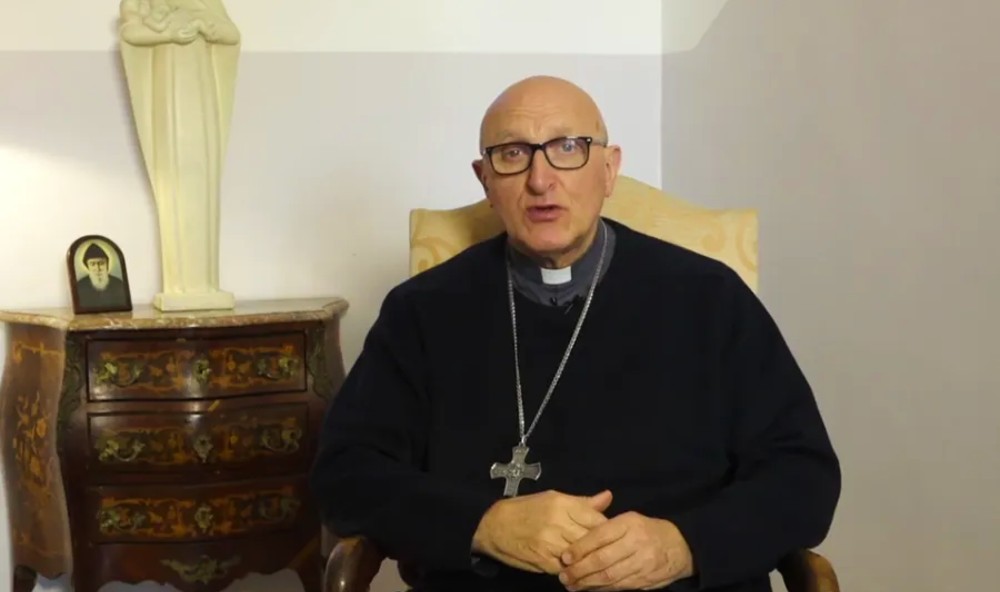 Dear readers, Catholic Online was de-platformed by Shopify for our pro-life beliefs. They shut down our Catholic Online, Catholic Online School, Prayer Candles, and Catholic Online Learning Resources—essential faith tools serving over 1.4 million students and millions of families worldwide. Our founders, now in their 70's, just gave their entire life savings to protect this mission. But fewer than 2% of readers donate. If everyone gave just $5, the cost of a coffee, we could rebuild stronger and keep Catholic education free for all. Stand with us in faith. Thank you. Help Now >
Dear readers, Catholic Online was de-platformed by Shopify for our pro-life beliefs. They shut down our Catholic Online, Catholic Online School, Prayer Candles, and Catholic Online Learning Resources—essential faith tools serving over 1.4 million students and millions of families worldwide. Our founders, now in their 70's, just gave their entire life savings to protect this mission. But fewer than 2% of readers donate. If everyone gave just $5, the cost of a coffee, we could rebuild stronger and keep Catholic education free for all. Stand with us in faith. Thank you. Help Now >
The Heart's Witness Against Muhammad: The Murder of Ka'b bin Al-Ashraf
FREE Catholic Classes
Ka'b bin al-Ashraf, a chief of the Jewish tribe of Banu Nadi, was another victim of Muhammad's rise to power which personifies the alleged prophet's moral failings. Once Muhammad gained political power and the ability for force his will on others, some of the Jewish tribes around him grew mistrustful and opposed both his message and his rising influence. Muhammad ordered Ka'b bin al-Ashraf's murder, and authorized deception in the process.
Highlights
Catholic Online (https://www.catholic.org)
11/5/2012 (1 decade ago)
Published in Middle East
Keywords: Muhammad, murder, fifth commandment, natural law, Andrew M. Greenwell,
CORPUS CHRISTI, TX (Catholic Online) - Muhammad was driven by power, however he tried to disguise it or sublimate it by his invocation of Allah, and the Jews who lived in the town of Yathrib and elsewhere in the Arabian Peninsula who would not submit to his iron rule simply got in the way. The Jew that got in the way, that opposed the will or whim of this vicious man who covered his worldly ambitions with Allah's mantle, was promptly dispatched to Sheol.
The Fifth Commandment, if Muhammad knew it expressly at all, did not apply to Muhammad in his view. He doubtfully read Exodus, since he was supposed to be illiterate. Perhaps it might have done him some good had he read, "Thou shalt not kill. (Exodus 20:13; Deut. 5:17) It would also have done him well to have heard Jesus' angle on that commandment. (Matt. 5:21-22). He certainly seems not to have been open to the divine injunction that prohibited murder that was contained in the recesses of his heart, i.e., the natural law.
But in Muhammad's view, there was no need to read the Scriptures prior to his supposed revelations; they were corrupted on Muhammad's account (See Qur'an 5:13, 41.). And whatever was therein contained was of no moment since, by the supposed revelations of Allah which came to us through the mouth of Muhammad, whatever Muhammad did was perfect. If the Fifth Commandment has to take a back seat to Muhammad's "perfect" desires, and if the unwritten law of God in the heart of every man that says one should not kill an innocent man had to be squelched, then so be it: Allah and his messenger know best.
Unlike Yahweh, Allah did not say, "Thou shalt not kill." Rather, Allah said, "Thou shalt kill." Or so Muhammad would have it where it was to his political advantage.
Ka'b bin al-Ashraf, a chief of the Jewish tribe of Banu Nadi, was another victim of Muhammad's rise to power which personifies the alleged prophet's moral failings. Once Muhammad gained political power and the ability for force his will on others, some of the Jewish tribes around him grew mistrustful and opposed both his message and his rising influence.
Though Muhammad had ostensibly entered into an informal treaty with the Jewish tribes in the town of Yathrib (which later was known as Medina), there was tension between Muhammad's followers and the Jewish tribes, including the Banu Nadi. (This seems to be a chronic feature of Islam's relationship with its neighbors, even to this day.)
Al-Ashraf, it may be conceded, was an opponent of Muhammad, believed Muhammad a false prophet, and opposed himself to Muhammad's worrisome rise.
After Muhammad's victory at the battle of Badr, al-Ashraf grew particularly concerned. But is that a crime?
It was from Muhammad's vantage point. In Muhammad's eyes, opposition to him and his doctrine and will was anathema: nay, it was more than that; it was a virtual death sentence.
Moreover, Muhammad was like the devil, "the proud spirit [who] cannot endure to be mocked," as St. Thomas More put it, and al-Ashraf mocked both Muhammad and the Muslim women. "He [al-Ashraf] inveighed against the apostle," wrote a plaintive poem at the loss by the Quraysh tribe defeated at Badr, and "composed amatory verses of an insulting nature about Muslim women," Muhammad's biographer Ibn Ishaq tells us.
This was the extent of his alleged crimes.
The enmity between al-Ashraf and Muhammad and Muhammad's response to it is found in several sources, including Sahih al-Bukhari 3.45.687 and 5.59.369. The second hadith is particularly long, so only parts will be quoted here. The hadith begins:
"Allah's messenger said 'Who is willing to kill Ka'b bin Al-Ashraf who has hurt Allah and His apostle?'
Thereupon Maslama got up saying, 'O Allah's messenger! Would you like that I kill him?'
The prophet said, 'Yes.'
Maslama said, 'Then allow me to say a (false) thing (i.e., to deceive Ka'b).' The prophet said, 'You may say it.'"
So here we have two questionable moral lapses by Muhammad to the Realpolitik of the day. The first: a willingness to put a political opponent to death--political murder. The second: a willingness to use all manners of deceit to advance the political murder--lying. Here we find an instance of the questionable doctrine of taqiyya, or dissimulation, approved by the alleged prophet of Allah, the Arab war idol and transformed moon god who--unlike Christ who says, "I am the truth" (John 14:6)--says of himself that he is the "best of deceivers," Allahu khayru al-makirina, (Qur'an 3:54).
Based on the pretense that, as an opponent of Muhammad, he wanted to borrow a camel load or two of food, Maslama visited al-Ashraf at night and, together with his foster brother Abu Naila, was invited into Maslama's fort. The plan among the conspiring assassins was to compliment al-Ashraf on his perfumed hair, and, when he was distracted, to cut off his head.
The plan worked, and together Maslama and Abu Naila cut of Muhammad's enemy's head.
According to the Muslim historian Ibn Ishaq, the Muslim poet Ka'b bin Malik (who should be distinguished from the murdered Jewish poet and political enemy of Muhammad, Ka'b ibn al-Ashraf) said:
"Sword in hand we cut [Ka'b] down.
By Muhammad's order when he sent secretly by night Ka'b's brother to go to Ka'b.
He beguiled him and brought him down with guile.
Mahmoud [bin Maslama] was trustworthy, bold."
Ibn Sa'd's Tabaqat records Muhammad's delight at the successful murder of his political opponent:
"Then they cut his head and took it with them [and] . . . they cast his head before him [Muhammad]. He (the prophet) praised Allah on his being slain."
Allahu akhbar. The pseudo-prophet can rejoice at an innocent man's death, just like many of his followers could rejoice at the attack of the Twin Towers on 9/11, and the deaths of thousands who did none of their killers wrong. This is what happens when you are the prosecutor, the alleged victim, and the judge. The defendant, even if innocent, has no voice. This is because, in Islam, Allah and his messenger know best, Allahu wa rasulluhu a'lam.
This is the Muslim mantra that blinds him to the fact that his alleged prophet is a sinner, a violator of the natural law, and most certainly not an authentic prophet.
To exchange reason for Muhammad's Islam is a Mephistophelian bargain.
(This article is adapted from the book written by the author entitled, The Heart's Witness Against Muhammad: Why the Natural Law Proves Muhammad False.)
-----
Andrew M. Greenwell is an attorney licensed to practice law in Texas, practicing in Corpus Christi, Texas. He is married with three children. He maintains a blog entirely devoted to the natural law called Lex Christianorum. You can contact Andrew at agreenwell@harris-greenwell.com.
---
'Help Give every Student and Teacher FREE resources for a world-class Moral Catholic Education'
Copyright 2021 - Distributed by Catholic Online
Join the Movement
When you sign up below, you don't just join an email list - you're joining an entire movement for Free world class Catholic education.
-

-
Mysteries of the Rosary
-
St. Faustina Kowalska
-
Litany of the Blessed Virgin Mary
-
Saint of the Day for Wednesday, Oct 4th, 2023
-
Popular Saints
-
St. Francis of Assisi
-
Bible
-
Female / Women Saints
-
7 Morning Prayers you need to get your day started with God
-
Litany of the Blessed Virgin Mary
Pope Francis Accepts Resignation of Bishop Dominique Rey of Frejus-Toulon
-

Bound by Betrayal: Katie's Struggle with Lust, Lies, and Redemption
-

John: A Story of Addiction, Hopelessness, and the Search for Redemption
-
Science vs. Faith: The Battle for Truth and Hope
-
Regenerative Agriculture: The Answer to America's Chemical-Laden Food Crisis
Daily Catholic
 Daily Readings for Wednesday, January 08, 2025
Daily Readings for Wednesday, January 08, 2025 St. Thorfinn: Saint of the Day for Wednesday, January 08, 2025
St. Thorfinn: Saint of the Day for Wednesday, January 08, 2025 Prayer for a Blessing on the New Year: Prayer of the Day for Tuesday, December 31, 2024
Prayer for a Blessing on the New Year: Prayer of the Day for Tuesday, December 31, 2024- Daily Readings for Tuesday, January 07, 2025
- St. Raymond of Pennafort: Saint of the Day for Tuesday, January 07, 2025
- St. Theresa of the Child Jesus: Prayer of the Day for Monday, December 30, 2024
![]()
Copyright 2024 Catholic Online. All materials contained on this site, whether written, audible or visual are the exclusive property of Catholic Online and are protected under U.S. and International copyright laws, © Copyright 2024 Catholic Online. Any unauthorized use, without prior written consent of Catholic Online is strictly forbidden and prohibited.
Catholic Online is a Project of Your Catholic Voice Foundation, a Not-for-Profit Corporation. Your Catholic Voice Foundation has been granted a recognition of tax exemption under Section 501(c)(3) of the Internal Revenue Code. Federal Tax Identification Number: 81-0596847. Your gift is tax-deductible as allowed by law.








 Daily Readings for Wednesday, January 08, 2025
Daily Readings for Wednesday, January 08, 2025 St. Thorfinn: Saint of the Day for Wednesday, January 08, 2025
St. Thorfinn: Saint of the Day for Wednesday, January 08, 2025 Prayer for a Blessing on the New Year: Prayer of the Day for Tuesday, December 31, 2024
Prayer for a Blessing on the New Year: Prayer of the Day for Tuesday, December 31, 2024

